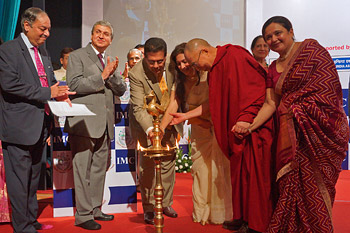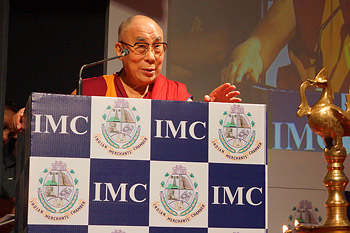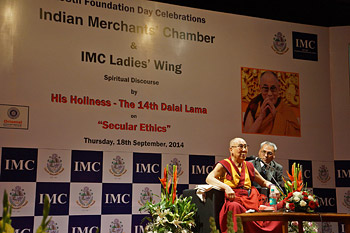Explaining Secular Ethics to the Indian Merchants’ Chamber and Its Ladies Wing
19/09/2014 11:30 (GMT+7) Font size:  
Mumbai, India, 18 September 2014 - The Indian Merchants’ Chamber was established in the early 20th century to promote trade, commerce, and industry by Indian entrepreneurs. Due to its dedication to making the Indian economy self-reliant, Mahatma Gandhi accepted an honorary membership in 1931. It includes a Ladies’ Wing concerned with inspiring, motivating and encouraging women to participate in entrepreneurial activities. The Managing Committee invited His Holiness the Dalai Lama to be Chief Guest at their 108th Foundation Day Celebrations and to address them on ‘Secular Ethics’. 
| His Holiness the Dalai Lama and fellow guests lighting a lamp to inaugurate the Indian Merchants’ Chamber's 108th Foundation Day Celebrations in Mumbai, India on September 18, 2014. Photo/Jeremy Russell/OHHDL
|
The IMC President, Prabodh Thakker welcomed His Holiness on arrival at the YB Chavan Auditorium at Nariman Point and escorted him to the stage. He was invited to inaugurate proceedings by lighting the lamp. Ms Leena Vaidya, a former President of the IMC Ladies’ Wing introduced His Holiness to the packed audience of more than 600.
He began his talk as ever by greeting his listeners as brothers and sisters, telling them how glad he was to be with them, joking that he understood they had been trying to invite him for two years. He continued:
“Whenever I meet anyone I think of them as just another human being. Many of us face a lot of problems, the majority of which are our own creation. They arise because we focus too much on the secondary differences between us, rather than on what unites us as members of one human family. If we take all humanity into account there should be no quarrels between us. Climate change is something that affects us all, while the global economy too functions beyond national boundaries or the limits of this or that faith.
“The world population continues to grow, leaving so many people poor. The gap between rich and poor is morally wrong. It also leads to practical problems. To deal with these things we have to see each other as members of the same human family. We need to trust each other and such trust can be based on a sense of our all being the same as human beings.”
His Holiness spoke of meeting an Indian official and his wife somewhere and of shaking their hands. But when he extended his hand to the nanny of their children, she shrank back in hesitation, because in front of them she evidently felt inferior. He also described meeting an African family in Soweto, South Africa. When His Holiness asked about their hopes for achieving greater freedom and equality under the new democratic constitution one of them hung his head and said, “We can’t compete with white people; our brains are just not as good.” His Holiness said he was shocked and remonstrated with him that white and black people’s brains are no different. He argued that if they were to ask scientists they would tell them that their brains were no different. Eventually the African sighed and agreed that it might be true, while His Holiness felt he had at least achieved something by convincing him of that.
Turning his attention back to India, His Holiness said that the ancient Indus Valley civilization had given rise to a remarkable number of thinkers and philosophers. In due course the Hindu, Jain and Buddhist traditions they spawned gave rise to the wonderful masters of Nalanda University. Nowadays many scientists are eager to learn from the knowledge that evolved there, so what started in the Indus Valley continues to have an impact on what we know today.
 | | His Holiness the Dalai Lama speaking at the Indian Merchants’ Chamber's 108th Foundation Day Celebrations in Mumbai, India on September 18, 2014. Photo/Jeremy Russell/OHHDL |
His Holiness repeated a verse by a 14/15th century Tibetan master that said, ‘In Tibet, the Land of Snow, the natural colour is white and yet until the light came from India, Tibet remained in the dark. Only when that light came was Tibet illuminated.’ For Tibetans, Indians were the gurus, while they were chelas (disciples). However, he laughingly said they are quite reliable chelas, because the fund of knowledge that derived from Nalanda had all but faded away in India, while it had been preserved intact in Tibet. Now it has been returned to the land of its origin.
“Today, contemporary Indians have the potential to combine modern knowledge of the material world with the ancient knowledge expressed in the Nalanda tradition. Many of our problems today derive from our lack of inner values. Everyone wants peace, but where does it reside? When a person has a peaceful heart, there is peace and ahimsa. Without such inner peace, ahimsa is impossible. Therefore peace depends on how we manage our emotions. In order to deal with our destructive emotions we have to know how emotions work. Then we can tackle our anger and fear.”
His Holiness teased his listeners by remarking that most Indians like to make prayers every morning to Ganesh, Sarasvati, Shiva and so on, but such prayers do not of themselves bring peace of mind. The proper way to achieve peace of mind, he said, is to overcome our destructive emotions and cultivate positive ones. He described the knowledge of how to do this contained in its ancient spiritual traditions as India’s treasure.
“It’s not only money we need to lead happy lives; more important is to find inner peace. We can find it by adopting secular ethics, the inner values of our ancient traditions. Consequently, we are working to design a curriculum through which we can introduce secular ethics to our education system.”
His Holiness then invited questions from the audience and the first was about how the knowledge of Nalanda came to be preserved in Tibet. He replied that there are more than 300 volumes translated from original Indian texts, mostly in Sanskrit, into Tibetan. About 10 were translated from Chinese. The content of these texts can be viewed under three main headings: science, philosophy and religion. The science can be studied like any other academic subject. Of the philosophy, the explanation of the Four Noble Truths is a Buddhist instruction, but the explanation of the Two Truths can be studied by anyone taking an academic approach. A book of science found in Buddhist literature has been prepared from such sources and is currently being prepared in an English edition from which other translations can be made.

| His Holiness the Dalai Lama responding to questions from the audience during the Indian Merchants’ Chamber's 108th Foundation Day Celebrations in Mumbai, India on September 18, 2014. Photo/Jeremy Russell/OHHDL
|
His Holiness stated that of the 7 billion human beings alive today, 1 billion declare themselves to be non-believers. There should be ways to share the idea of inner peace and the means to achieve it with them too, and he believes this can be done through education.
Asked how to balance a spiritual path with life in a material world, His Holiness pointed out that material facilities provide only physical comfort, which is necessary. He said that sensory pleasure does give some fleeting satisfaction, but the satisfaction derived from mental experience not dependent on sensory sources is much longer lasting. Many people seem to think that happiness depends on money and power; while some women seem to think it requires a pretty face. His Holiness recounted a Tibetan government official in the 1960s who had been a monk but disrobed and got married. His Holiness teased him that his wife was not very attractive and the official retorted that she might not be much to look at, but in terms of inner beauty she was exceptional. His Holiness confirmed that such inner beauty, warm-heartedness, is what is really important.
He remarked that unfortunately these days we find even religious people who are corrupt. They have faith but no sense of ethics. They pray every morning, offering flowers and incense, but it is as if they are asking, “Please bless me that my corrupt activities should be successful.” The audience laughed and His Holiness told another story of a pious Cuban refugee he met in the USA who told him earnestly that he prayed every day that God would take Fidel Castro to heaven as soon as possible.
To a question about what he would say if he were to meet one of the ISIS leaders today, he replied that when people’s emotions are completely out of control it is very hard to deal with them. He recalled writing to his friend President Bush after the September 11th event expressing his condolences, but hoping that whatever steps were taken as a result would be non-violent. He warned of the risk that otherwise one Bin Laden would become ten or a hundred Bin Ladens, which seems to be what has happened. He mentioned that Muslim friends have told him that a Muslim who causes bloodshed is no longer a real Muslim and that jihad is not about external conflict, but about grappling with our destructive emotions.
Another questioner mentioned that the Chinese President and his wife are currently visiting Indian and wanted to know what His Holiness thought of him. To begin with he replied that this was something of a political question and that he had completely retired from political responsibility in 2011. On the other hand he suggested that it is most important for Sino-Indian relations to be founded on mutual trust. He hoped that Xi Jinping would observe during his time in India that although different languages, scripts and cultural traditions flourish in this country they bring with them no threat of separatism or the breakup of the country. He noted that the social harmony commended by Chinese leaders can only come about on the basis of trust, not as a result of the use of force. Meanwhile, China is the only country in the world where the internal security budget exceeds that of defence.
He voiced support and admiration for the way Xi Jinping is trying to tackle corruption and noted with interest his remarks in Paris that Buddhism has an important role to play in reviving Chinese culture. While hardliners in the Chinese system continue to take a mechanical approach, with little room for common sense, Xi Jinping seems more practical and realistic.
“Overall I’m optimistic,” he said, adding “of course I knew his father Xi Zhongxun who was a secretary to Zhou Enlai.”
A final questioner asked the difference between Hinduism and Buddhism. His Holiness responded that in terms of shila - ethics, samadhi – concentration, and vipasyana – insight, they are much the same. They both also accept the existence of karma and rebirth. Where they differ is in their assertions about atman and anatman. He said:
“I’m a Buddhist, so I follow the view of anatman, but whichever you believe, atman or anatman, is a private matter.”
Bringing the meeting to a close, Mrs Arti Sanghi, President of the IMC Ladies’ Wing thanked His Holiness for coming and for giving such a thoughtful talk. The audience added their warm applause and many pressed forward to get nearer to him as he left the building.  http://www.dalailama.com/
|